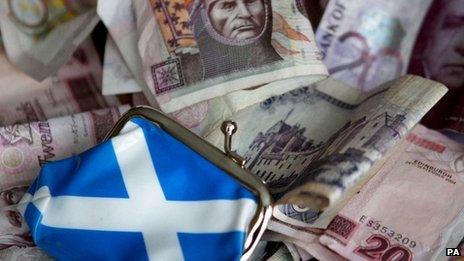Scottish independence: Scotland 'should keep Sterling'
- Published

The commission believe it would be in the interests of the rest of the UK for Scotland to keep Sterling
Economists have said an independent Scotland would need a formal deal with the rest of the United Kingdom on how to run a joint currency.
The panel of experts, established by the Scottish government also said agreement would have to be reached on how much it could tax and spend.
Their first report suggests there would have to be rules and new institutions created to manage the economy.
They said this would require continued integration with the rest of the UK.
Planners for independence are also being advised to put oil revenues in a long-term fund rather than spending them immediately on public services.
Scottish Finance Secretary John Swinney said the report "proves the necessary preparations are taking place to ensure an independent Scotland is ready for the challenges ahead".
The Fiscal Commission Working Group (FCWG), chaired by former Scottish Enterprise chief Crawford Beveridge, was asked by ministers to plan for how Scotland would become independent, if there is a "yes" vote in the 2014 referendum.
Set up in March 2012, it was "to provide impartial technical advice on economic choices, challenges and opportunities for Scotland post-independence".
Mr Beveridge says the framework they have published could operate "from day one". However, it would require extensive negotiations with Whitehall, and it is recommended that these start as soon as possible.
The report claims that it would be in the interests of the rest of the UK - to promote trade, competitiveness and financial stability - that there should be co-operation on jointly managing the sterling currency and other policies on finance.
The report proposes that Scotland should have a shareholding in the Bank of England, based on its population share of nearly 10%. This should ensure a role in appointments to key committees, and oversight at meetings by Scottish officials.
Sterling currency zone
It says there should be a Macroeconomic Governance Committee, in which the economic institutions of Scotland and the rest of the UK would co-ordinate policy.
The risk of banks becoming insolvent should be co-ordinated across the sterling currency zone, it is proposed. That means that London and Edinburgh institutions would share the risk of another financial crisis.
The working group argues a currency union between Edinburgh and London would not be vulnerable to the problems that have beset the eurozone.
They say the differences ranging from Germany to Greece are diverse, but detail the many ways in which Scotland's economy is already very similar to that of the rest of the UK.
Ensuring a formal currency pact would require a 'fiscal sustainability agreement', placing limits on both countries' tax and spend totals, says the report. But it is pointed out that would still leave Scottish ministers flexibility in the way they tax and their spending priorities.
To help with that, a future report from the working group is to seek ways an independent Scotland could have a simpler taxation system.
The group says new institutions and rules would have to be put in place, above all to ensure credibility of the new institutions.
Whereas the SNP government has said it would look to London to provide regulation of the financial sector, the new report says Scotland may have to do some of that itself.
That is at least partly because European rules would require it.
It proposes a Scottish Monetary Institute, which would carry out research, monitor the economy and financial institutions, collect data and possibly include some roles in regulation.
It also says there should be a Fiscal Commission to advise future Holyrood governments on the public finances - a role now carried out for the UK by the Office of Budget Responsibility.
Oil tax surplus
While Scotland's public spending levels at present would require all of the oil revenues it can expect from oil, and still leaves a significant government deficit, there is a warning that an independent Scottish government should make cautious budget assumptions about oil revenues when they are so volatile.
The economists say that if oil tax delivers more than conservatively planned, that surplus should be put in a fund to handle future shocks.
Such a recommendation implies a significant cut in current levels of spending, though it is suggested the change should be implemented in the medium term.
Tackling the question of transferring a share of the UK's debt, the experts consider several options and conclude it should be "gradually transferred" as bonds mature and need rolled over, saying this would be a "sensible and efficient solution".
Mr Beveridge commented on the report: "Scotland has the clear potential to be a successful independent nation. A macro-economic framework, that is based upon fiscal discipline and financial stability is an important pre-requisite for prosperity, fairness, economic opportunity and security."
He said the recommendations form "a workable blend of autonomy, cohesion and continuity. It is a well-engineered model designed for day one of independence".
As well as Mr Beveridge, who also chaired an independent commission for the Scottish government into public spending, the Fiscal Commission Working Group includes two winners of the Nobel economics prize, Joseph Stiglitz and Sir Jim Mirrlees, as well as Scottish economist Andrew Hughes-Hallett and Frances Ruane, an Irish expert in public finance.
Mr Swinney, said: "This incredibly detailed paper is one of the most thorough assessments of Scotland's economic position, challenges and opportunities and provides an important contribution to the debate on Scotland's constitutional and economic future."